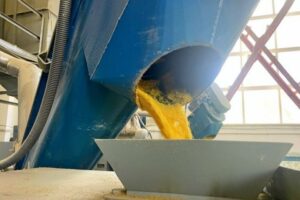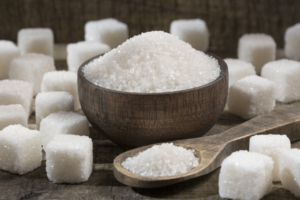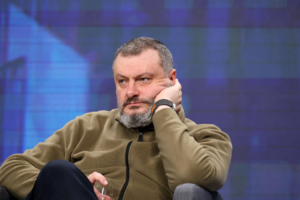
Ukraine currently has 22 million tons of oilseed processing capacity, and oil extraction plants (OEP) are still under construction, so processing volumes could reach 25 million tons in the near future, but it will not be easy to secure raw materials, said First Deputy Minister of Agrarian Policy and Food Taras Vysotsky.
“According to estimates, we have up to 22 million tons of capacity (OEZ – IF-U), and (OEZ – IF-U) are still under construction, which means there will be 22-25 million. Frankly speaking, it will not be easy to achieve such a volume (of raw materials for processing enterprises – IF-U).
Purely from an agronomic and agrotechnological point of view,” he commented at a meeting of the Trend&Hedge Club on the parliament’s decision to impose duties on soybean and rapeseed exports. Vysotsky explained that farmers would not be able to increase soybean production in a year by irrigating an additional 1 million hectares.
Such an investment pays off within 5-15 years and is a “long story.” Although such an expansion would significantly improve the situation for processors.
The deputy minister also does not see any prospects for significant potential for expanding areas and increasing yields for rapeseed.
“It may not be 3-3.5 million tons (Ministry of Agrarian Policy’s forecast for rapeseed production for the 2025 season – IF-U), it may be 5 million tons, as in 2022, or 4.8 million tons, as in 2023,” he stated, noting that it is difficult to talk about increasing production to 8-10 million tons per year, although there is land, plots, and all the necessary areas for cultivation.
According to Vysotsky, Ukrainian farmers can grow not 12 million tons of sunflower seeds in the 2025 season, but 15 million tons, with the maximum yield of the crop potentially reaching 25 million tons.
“This will be the ceiling, I declare, that can be grown within the controlled territories of Ukraine. Within the territories controlled by Ukraine, it is realistic to reach more than 23 million tons from the current 20.5 million tons (sunflower production – IF-U). If everything goes well, it could reach 25 million tons. But this is impossible in the coming years,” he explained.
The first deputy minister stressed that the processing industry has grown more than it can be supplied with raw materials in the period up to 2030.
“From a logical point of view, the seller’s market should remain in the country, but the issue of purchasing raw materials for processing should not be so (acute – IF-U),” he concluded.
As reported, at its meeting on July 16, the Verkhovna Rada supported draft law No. 13134 on the introduction of a 10% export duty on soybeans, colza seeds, and rapeseed (crushed and uncrushed) with an annual reduction of 1% until 2030, to a level of 5%.
According to Vysotsky, the Ministry of Agrarian Policy and Food forecasts oilseed production in the 2025 season at 20.5 million tons, including rapeseed at 3 million tons and soybeans at 5.7 million tons. The sunflower harvest in the southern regions is under threat due to drought and may be less than 13 million tons.

Between January and June 2025, medical supplies worth UAH 14.26 billion were purchased through the Prozorro Market electronic catalog.
According to the state-owned enterprise Medical Procurement of Ukraine (MPU), which administers the medical section of the catalog, this figure is UAH 4 billion, or 42.6%, more than in the first half of 2024.
According to the MZU, since the introduction of mandatory procurement through Prozorro Market, customers have saved UAH 2.05 billion, which is an average of 13% of the expected cost.
In addition, the percentage of deals closed in the e-catalog during this period was 79% compared to 70% in open tenders, and the average duration of the procedure was eight days compared to 16 days in open tenders.
The number of customers in January-June increased to 2,420, and the number of qualified suppliers to 5,294.
The Prozorro Market e-catalog is a marketplace where public customers can easily, efficiently, and economically purchase the goods they need, and suppliers can sell their products.

Businessman Vyacheslav Mishalov, who owns significant assets in several sectors, mainly concentrated in the Dnipro region, considers investments in agro-processing, which has export potential, to be promising and is interested in such projects, he said in an interview with the Interfax-Ukraine news agency.
“I am not involved in the agricultural sector. I’m not into farming, but I think processing is the next big thing in Ukraine. It’s already huge, but it’ll get even bigger because processing different crops is a never-ending process, it’s super high-tech, and Ukraine has a lot of room to process anything,” Mishalov said.
In his opinion, there is also a lot of room for craft products in this sector, so small businesses can also enter this market.
The businessman clarified that the absence of such objects in his portfolio is due to the fact that he has not yet come across good teams with the necessary experience in processing.
Mishalov also said that he remains interested in Dnipropres Steel, which he has left as an owner but has an option to buy the company under a “rather complex agreement.”
According to him, the company continues to pursue a very active and extensive modernization program, and the businessman himself cooperates with it as a consultant, advisor, independent member of the supervisory board, and seller of its products.
“This is an export-oriented business, and I really like it in the long run. Ukraine used to have very good schools and universities. And although this is no longer the case today, Ukraine is a very good place for individual metallurgy projects, ‘pearl buttons,’” Mishalov described his vision for the industry’s prospects.
Regarding the possibility of other investments, he noted that he has no plans for them at this time, with the exception of some local and specific ones.
“Today, we are completing all major investment decisions that were made earlier and are not starting any new ones yet. We need to wait a while — the risks are very high, and the horizon for stability is short. Given these factors, it is definitely not possible to make large investments,“ the businessman said, explaining his position. He added that he is currently completing an alternative energy project related to gas generation, which will be ready for announcement within the next three to four months. ”But again, these are necessary measures.
If we did not have our own large consumption, we probably would not have gone ahead with the gas generation project either, because the risks are high and the equipment is fantastically expensive,” Mishalov added.
According to him, there have been several attacks on his assets, the principle of which is unclear, but they are very precise, and each time the losses are measured in tens of millions of hryvnia.
Regarding the Lotus network of four gas stations in Dnipro and Novomoskovsk and the petroleum products trader Lotus Oil Trading, the businessman noted that these assets are currently illiquid due to unfavorable market conditions, where “profitability is good if it is zero,” and consumption is falling.
As for the news portal Informator, Mishalov claims that it is just a business.
“There was a time when it was a good business, and I had very successful experience selling similar assets. Today is probably not the best time. But that’s okay — we’ll wait and sell a little later.
In the long run, it’s a good business,” he said.
According to him, Informator is currently performing well, is active on social media, and is close to the top ten in terms of real audience.
Mishalov, who was secretary of the Dnipro City Council in 2016-2017, categorically denied plans to return to politics. “I don’t even know how much I would have to pay to go back there. It’s definitely not for me,” the businessman said.
As the businessman said in an interview, all his assets are already quite well structured and managed through the closed non-diversified venture corporate investment fund Fortress. Mishalov’s investments also include the financial company Ye Groshi, the provider Fregat, and an IT division.
The fund, in turn, is managed by the asset management company LLC “KUAA ”MPSS” from Dnipro, owned by Sergei Shishkin (50%), Igor Sukhodolsky (41%), and Olga Mukhina (9%).

The Czech Chamber of Food Industry has expressed concern over the European Union’s plans to significantly expand duty-free import quotas for Ukrainian agricultural products. A press release published on July 15 states that this threatens the Czech sugar industry. According to the Chamber, the quota for duty-free sugar imports from Ukraine to the EU could be increased from the current 20,070 tons to 100,000 tons — five times more. As a result, Czech producers fear a decline in self-sufficiency and a repeat of the situation with the closure of the plant in Hrušovany nad Evšovkou, which was linked to the influx of cheap imported sugar.
The Chamber’s president, Dana Večeržová, said: “If quotas continue to rise, we risk seeing the closure of new enterprises and ineffective investments not only in the sugar industry, but also in other strategic sectors.”
The decline in the Czech Republic’s self-sufficiency in sugar creates dependence on imports and devalues investments. Producers are calling on the government to abandon the quota increase and demand the introduction of restrictive mechanisms (automatic protective measures, price thresholds, and individual quotas) in negotiations with the European Commission.
Poland, Slovakia, Hungary, Bulgaria, and Romania have expressed their support for the Czech position. They signed a joint declaration calling on the European Commission to introduce protective measures for the most vulnerable sectors of the EU — sugar, grain, and meat.
In 2024, the Czech Republic imported 27.9 million kg of sugar from Ukraine (out of a total of 81.1 million kg) worth CZK 461 million. This is several times higher than the 2021 level of 3.7 million kg.
A fivefold increase in quotas for Ukrainian imports to 100,000 tons could seriously weaken the Czech sugar industry, threatening jobs and infrastructure.

According to information published in the Ukrainian media, former Secretary of the National Security and Defence Council (NSDC) of Ukraine Oleksandr Litvinenko may become the next Ukrainian ambassador to Serbia. This was reported by Verkhovna Rada deputy Oleksiy Goncharenko on his Telegram channel, citing sources in the presidential administration.
It is reported that Vladimir Zelensky will soon approve Litvinenko’s appointment to the diplomatic mission in Belgrade by decree.
There has been no official confirmation from the Office of the President or the Ministry of Foreign Affairs of Ukraine yet.
Oleksandr Valeriyovych Litvinenko, born on 27 April 1972 in Kyiv, is a Ukrainian statesman and public figure.
Education: graduated from the Institute of Cryptography, Communications and Informatics of the Russian FSB Academy (1994), received academic degrees in Kyiv and London.
He began his career in the Security Service of Ukraine (1994–1998), then held positions in the National Security and Defence Council, the Security Service and the National Institute for Strategic Studies.
In 2021–2024, he headed the Foreign Intelligence Service of Ukraine.
On 26 March 2024, by presidential decree, he became Secretary of the National Security and Defence Council, holding this position until July 2025, after which he was dismissed.
Litvinenko is a Doctor of Political Science, professor, major general, and Honoured Worker of Science and Technology of Ukraine.
According to Volodymyr Zelenskyy, Litvinenko is ‘a professional with an excellent reputation,’ and he himself is a key figure in the formation of diplomatic strategies.
It is expected that after the decree is signed, the appointment will be sent to the Serbian Assembly for approval. If the candidacy is approved, Alexander Litvinenko will head the Ukrainian diplomatic mission in Belgrade.
The main task is to strengthen bilateral political and economic dialogue, strengthen Ukraine’s position in the Balkans and promote European integration.
The appointment of Oleksandr Litvinenko as Ukraine’s ambassador to Serbia reflects Kyiv’s desire to strengthen its diplomatic presence in the Balkans. His experience working in the National Security and Defence Council, the Foreign Intelligence Service, and strategic institutions makes him a strong candidate for strengthening Ukrainian-Serbian relations.

From November 1, 2025, Poland will stop accepting Ukrainian refugees in collective accommodation centers, with the exception of members of so-called protected groups: pensioners, pregnant women, and people with disabilities. This was reported by Polish Radio, citing a decision taken by the Polish Council of Ministers at a meeting on July 16.
According to Joanna Bachanek, press secretary of the Mazovia Province, every Ukrainian citizen has the right to free accommodation in shelters for 120 days after arriving in Poland.
After this period, a period of financial participation begins, i.e., additional payments for accommodation and food.
“More than half of the residents of collective accommodation centers already pay for part of their stay. After November 1, such centers will operate exclusively for the elderly, pregnant women, and people with disabilities,” Bahanek said.
According to the authorities, there are currently about 3,000 Ukrainians living in the Mazovia Province, while there are only about 1,000 places available.
For the remaining Ukrainian citizens, the Polish authorities are planning to launch the “Wspólnie do niezależności” (“Together for Independence”) program, which provides:
The program is expected to enable gradual adaptation and transition from a system of state support to a model of independent living.